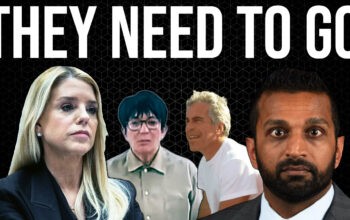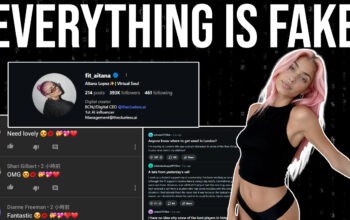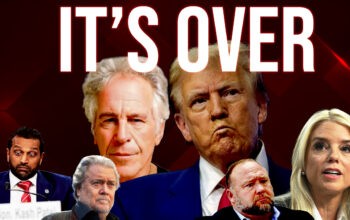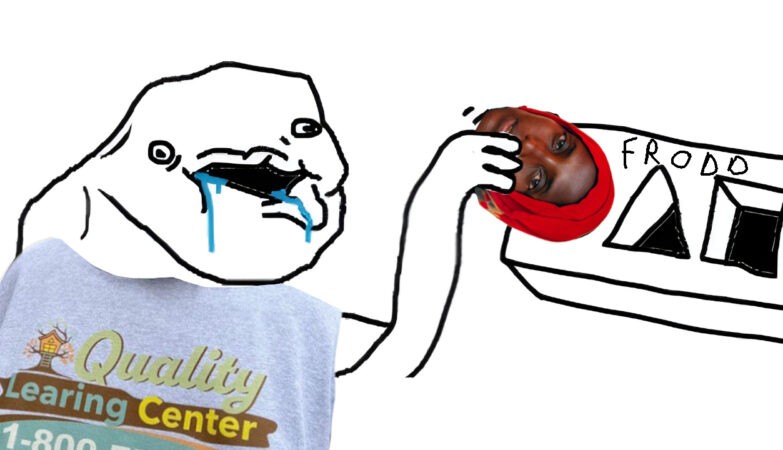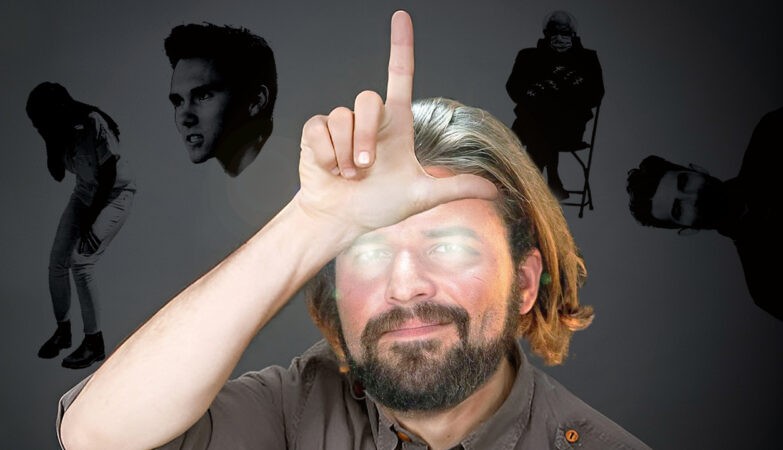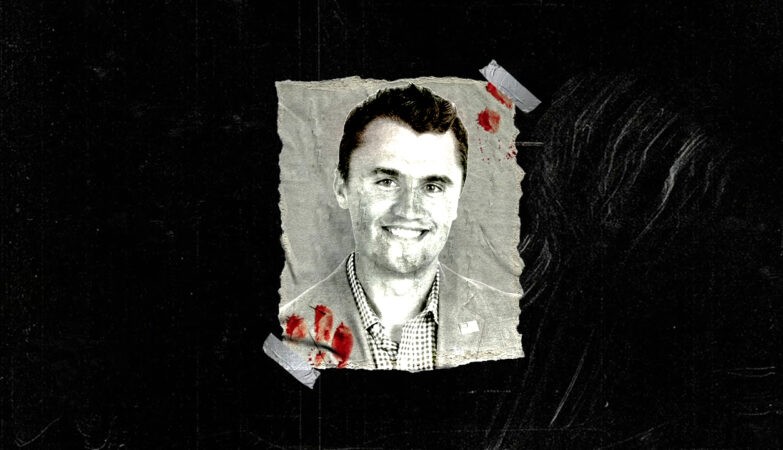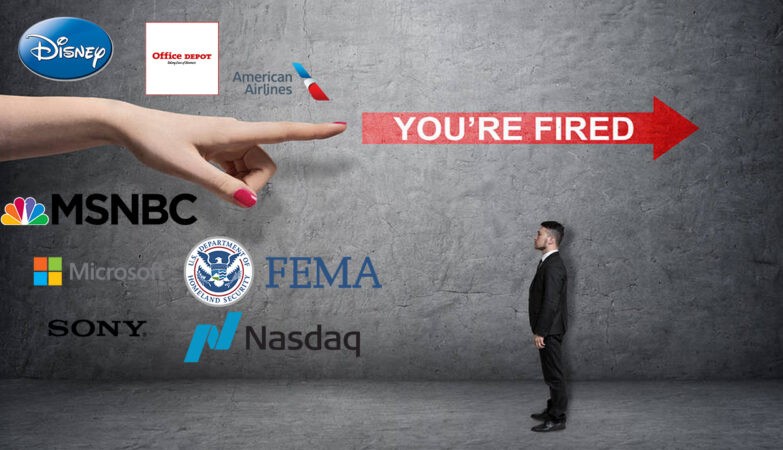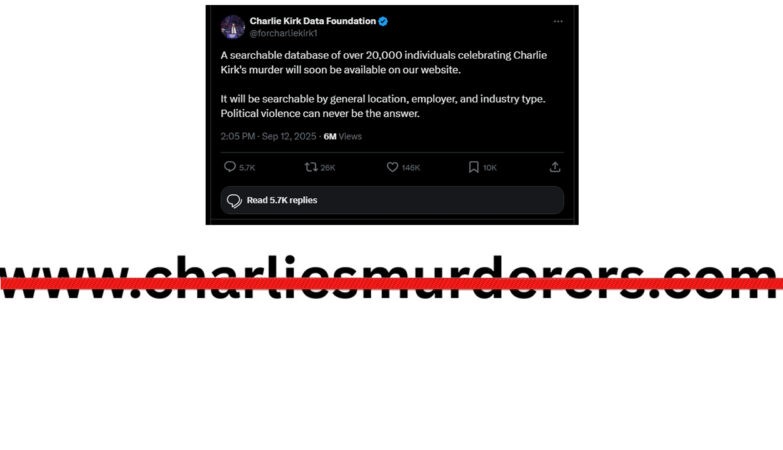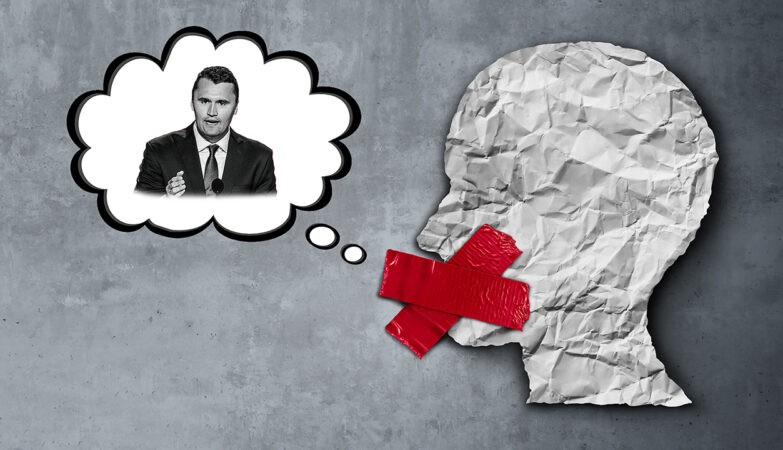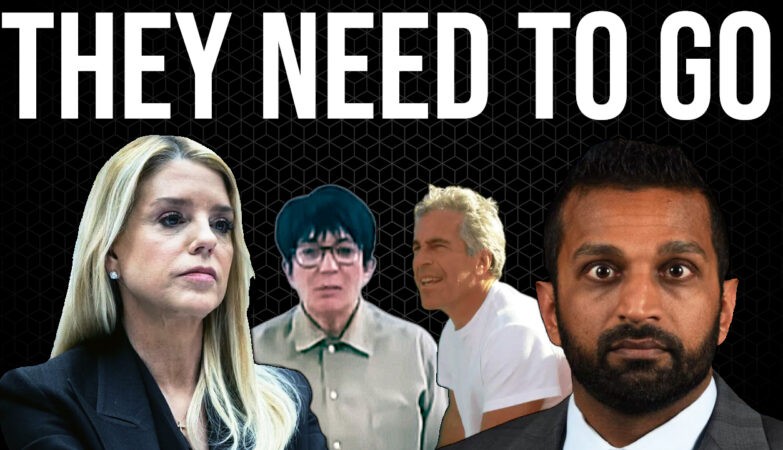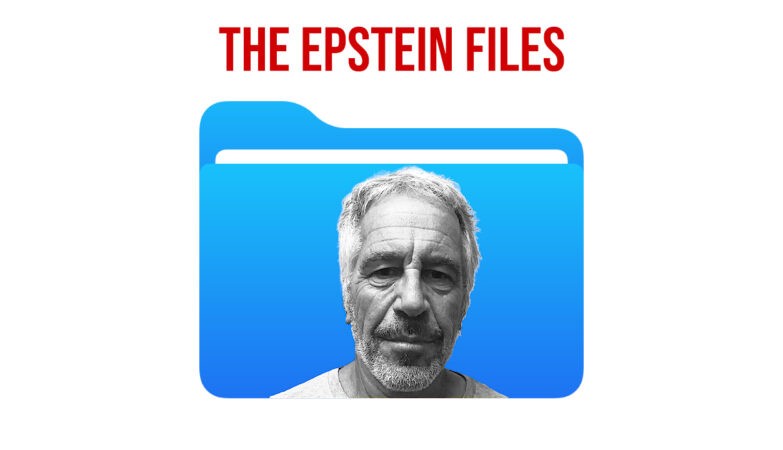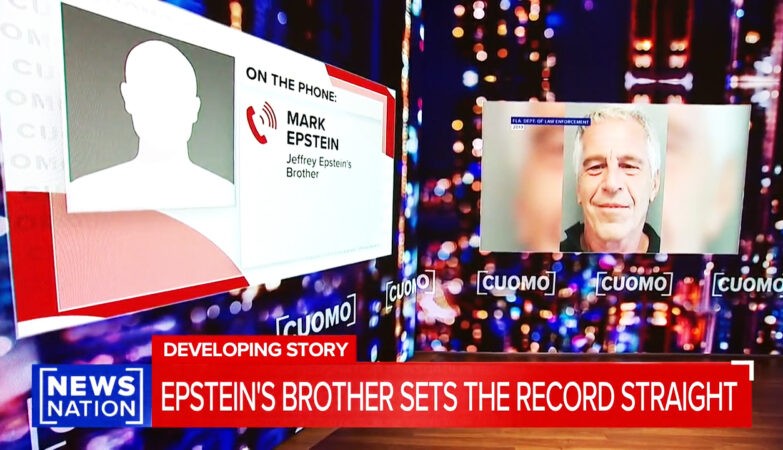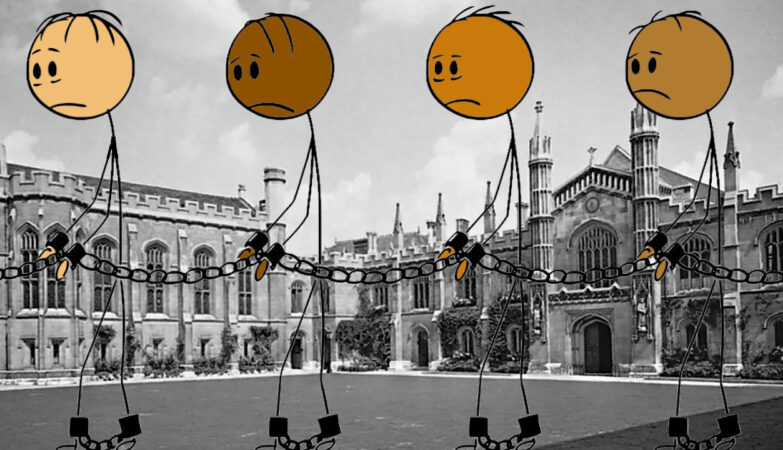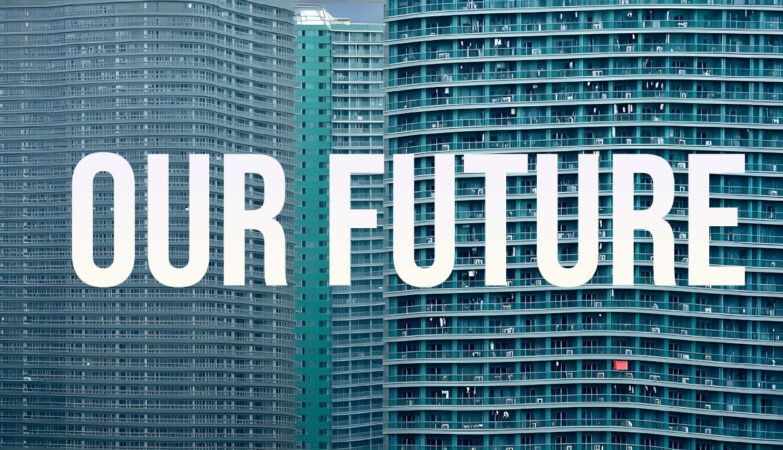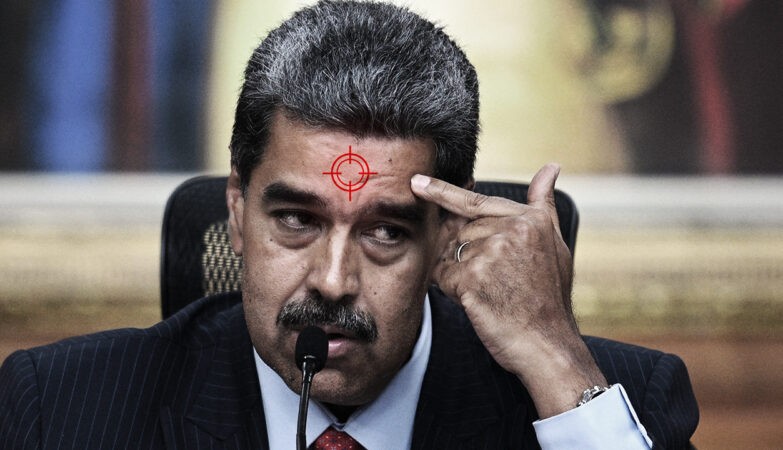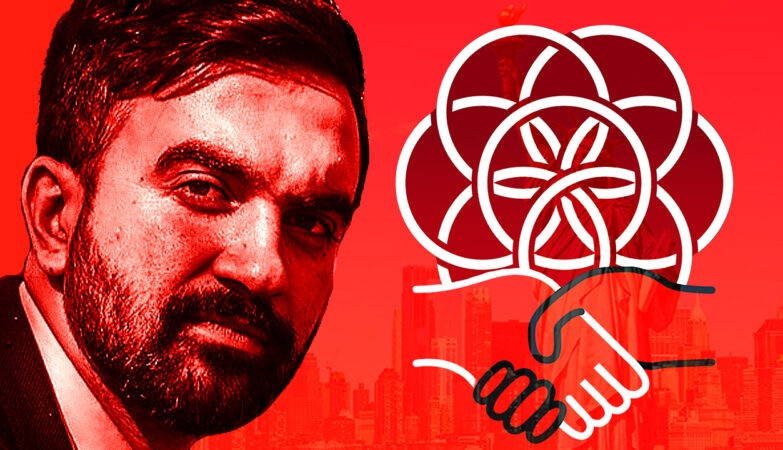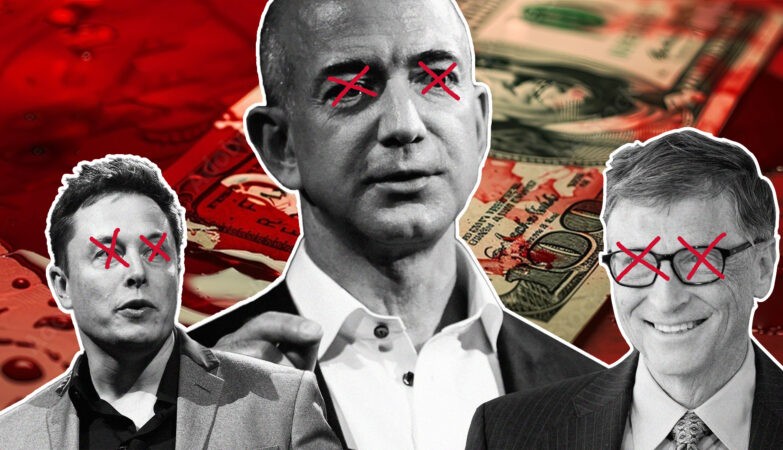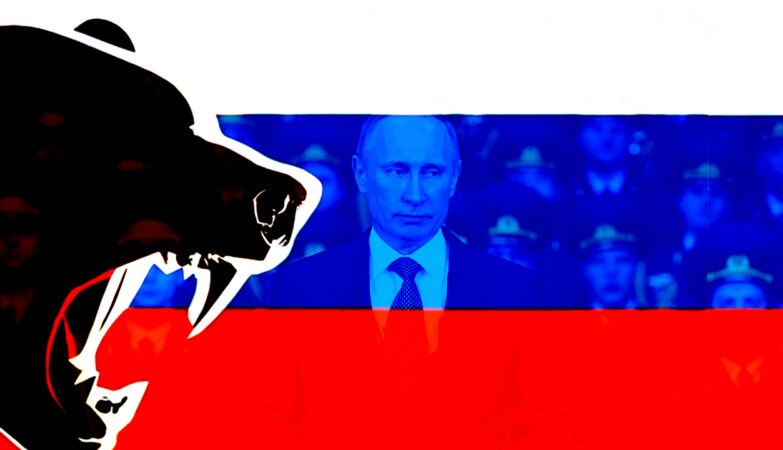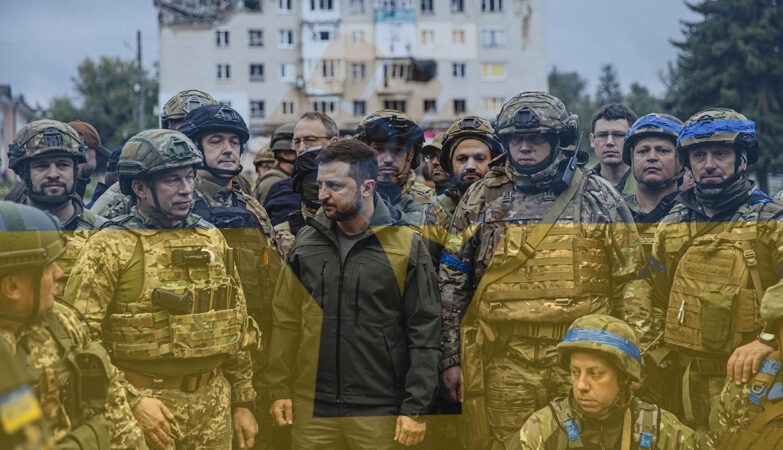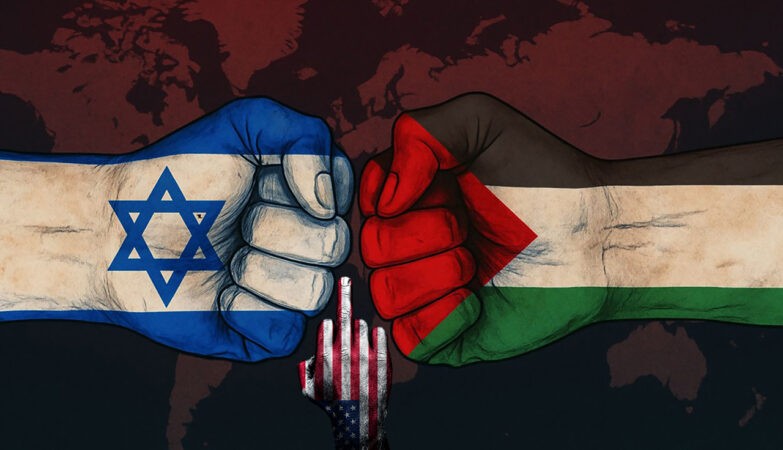Internationally, levels of personal freedom continue to decrease; COVID has, of course, played a role, but the downward spiral started long before the pandemic.
For freedom to flourish, democracies are required. Around the world, however, established democracies are in decline. Again, the decline was occurring long before the pandemic hit.
Democracy, we’re told, dies in darkness. No, democracy dies in Davos.
If in doubt, please read the following:
“Welcome to the year 2030. Welcome to my city – or should I say, ‘our city’. I don’t own anything. I don’t own a car. I don’t own a house. I don’t own any appliances or any clothes. It might seem odd to you, but it makes perfect sense for us in this city. Everything you considered a product, has now become a service.“
These are not lines from an episode of “Black Mirror.” No, these lines come directly from the World Economic Forum website. Founded in 1970, the World Economic Forum (WEF) is arguably the most influential platform in the world. Each year, some of the most influential figures in politics and tech gather for a meeting in Davos. The most recent meeting occurred in January, and the topics discussed are of profound importance.
As Anthony P. Mueller, a professor of economics, warns, “The main thrust of the forum is global control. Free markets and individual choice do not stand as the top values, but state interventionism and collectivism. Individual liberty and private property are to disappear from this planet by 2030.”
Not me, you say. I didn’t sign up for this. In the world of biopolitics, where the lines between human biology and politics become indistinguishable, your vote really doesn’t matter. In fact, you don’t have a vote. This isn’t the same loss of freedom that, say, the likes of Alexei Navalny is experiencing right now. No, this loss of freedom is attritional in nature; death by a thousand cuts.
Now, before I am accused of conspiratorial thinking, let me point you in the direction of The Commons Project. Supported by the WEF, The Commons Project is in the process of creating mandatory vaccine passports. According to the project’s site, for “travel and trade to return to pre-pandemic levels, travelers will need a secure and verifiable way to document their health status as they travel and cross borders. Countries will need to be able to trust that a traveller’s record of a COVID PCR test or vaccination administered in another country is valid.” In order to travel internationally, millions of people will have no option but to acquiesce. Are humans becoming nothing but algorithmic afterthoughts?
The writing is very much on the wall, and it reads: Obey your Master.
The Membership
From Goldman Sachs bankers to United Nations bureaucrats, delegates descended on Davos, Switzerland, for the 2020 annual meeting of the World Economic Forum (WEF).
The conference, now in its 52nd year, is a perennial draw for the world’s most powerful people to discuss the most pressing issues facing the global economy—or at least make them feel like that’s what they’re doing.
The WEF has publicized the attendees to varying degrees in recent years. At times it has kept the list private, released it in full, or released it while excluding certain groups of people.
Last year, the WEF publicly released its list without names of participants and cited the European data-privacy law known as GDPR as the reason for doing so. That list included person-by-person demographic information, not linked to any identifiable information. A separate list with names is provided to press in attendance; it includes instructions not to release the names of attendees.
Information about the year’s attendees was submitted to Quartz anonymously through their Secure Drop portal. By name, it matched the 2,784-person list made available to journalists. However, the information they received contains more detail on attendees than Quartz states they have ever seen and reveals, in ways never before disclosed, how the WEF catalogs and categorizes the world’s powerful people.
The World Economic Forum declined to comment on the list or the purpose of the categorization.
You can explore who’s on the list of 2,630 participants by sorting and searching the interactive graphic on Quartz, or by downloading the list (PDF) below.
The Costs to Be a Member
While you do have to be a member to attend, admission is not included in the membership fee, according to the BBC. Anyone coming to represent a company is charged 27,000 Swiss francs ($28,000) to attend, while activists and political leaders can come free of charge.
This sum also only covers the lowest tier of WEF membership, the BBC reported. The higher tiers have annual fees ranging up to 600,000 Swiss francs ($620,000).
The Security Budget
The resort town is a “veritable fortress” during the event, according to The New York Times’ Michael J. de la Merced and Russell Goldman.
There are rooftop snipers and airport style-security at the main conference center, the BBC reported.
The Swiss government paid 8,000,000 ($8.3 million) for security during the four-day event in 2017.
Billionaires
119 people, approximately 5% of the conference’s 2,000-person guest list are billionaires, Bloomberg reported. Marc Benioff, Jamie Dimon, Sheryl Sandberg, and Stephen Schwarzman are all scheduled to be there.
CEOs
Of those expected, 680 participants have “chief executive” in their titles. Diageo CEO Paul S. Walsh and Yahoo CEO Marissa Mayer can expect to run into NYSE Euronext CEO Duncan Niederauer, and Citigroup CEO Michael Corbat.
Not all of the executives are at the helm of global multinationals. Perry Chen, the CEO and co-founder of the crowd funding website Kickstarter, Drew Houston of file backup and sharing service Dropbox, and Daniel Ek of on-demand music service Spotify, are expected to attend.
Bankers
From Wall Street, there are seven Citigroup employees participating. JPMorgan Chase, Goldman Sachs, and Deutsche Bank are each sending six and UBS, Morgan Stanley, Bank of America and HSBC will each have a delegation of five.
Regions
The preliminary Davos program (PDF) includes sessions titled “Global Leadership in Transition” (with simultaneous translation in English, Chinese, and Japanese), “De-risking Africa,” and “Connecting Latin America.” Nonetheless, only 4.9% of the participants are coming from China and Japan, 4.8% from Africa and only 3.1% from South America. Two-thirds of the participants come from North America or Europe. Less than 17% of the world’s population lives in those two regions.
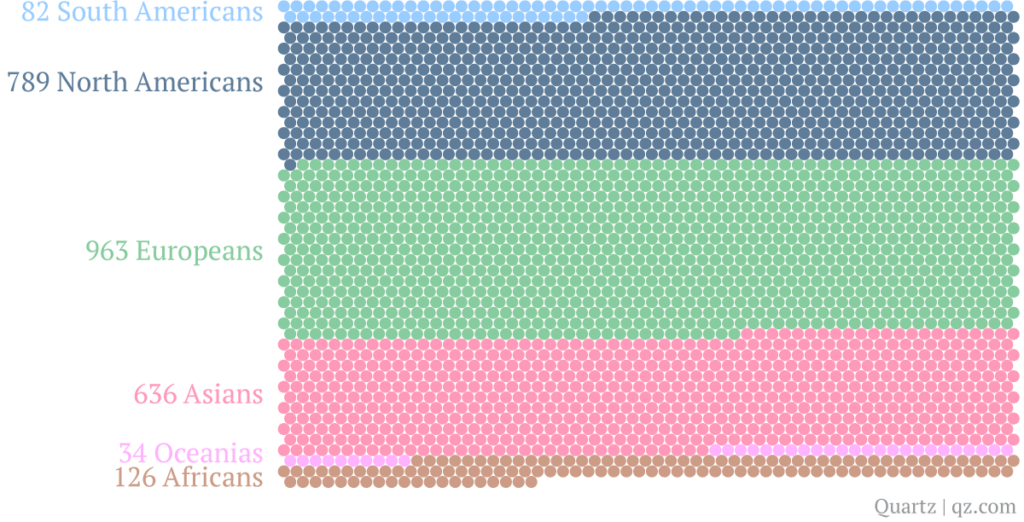
Politicians and Bureaucrats
Thirty-seven sitting prime ministers and presidents are expected, including Shimon Peres of Israel, Mario Monti of Italy, and Dmitry Medvedev of Russia.
From the US, at least three senators, five members of the House of Representatives, and the governors of Maryland, Delaware, and Colorado are expected to attend. The bureaucrats at the top of the Federal Trade Commission, Federal Communications Commission and the Food and Drug Administration are also listed. Most are participating as panelists or speakers during at least one session during the event, according to a copy of the schedule.
Out of office politicians will also be in attendance. Former US President Bill Clinton and Former UK Prime Ministers Gordon Brown and Tony Blair are listed as participants this year. All three are currently serving as UN representatives. Clinton is the UN Special Envoy to Haiti, Brown the Special Envoy for Global Education and Blair is the UN Middle East Quartet Representative. Eighty-nine-year-old Henry Kissenger, US Secretary of State under Presidents Nixon and Ford, is listed as well.
Fifteen more administrators of United Nations programs are listed as participants including Secretary General Ban Ki-moon and the executive directors of UNICEF, UNESCO, and the World Food Program.
In all there are more than 300 participants expected to attend who hold positions in governments around the world.
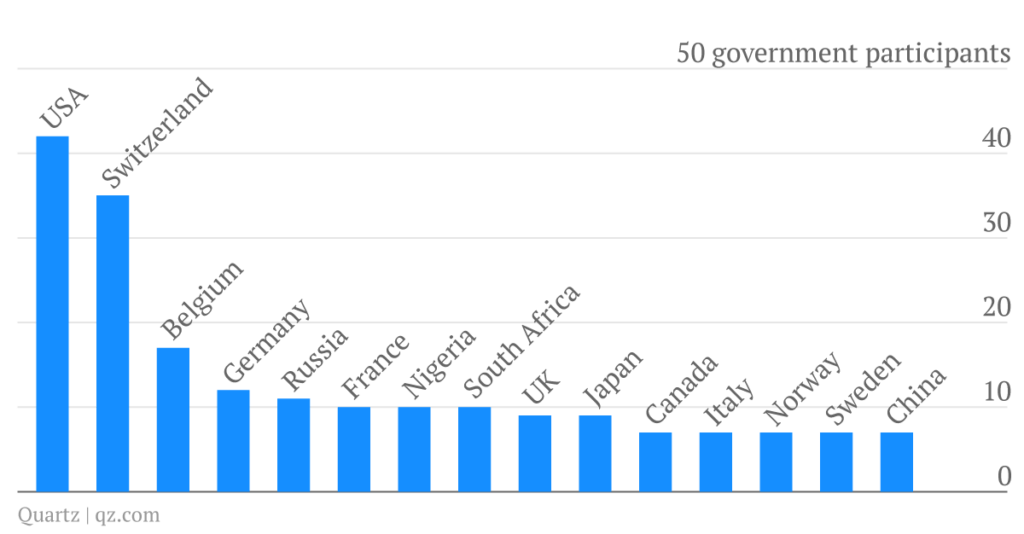
Academics
There are at least 14 Nobel Prize winners scheduled to attend and participate in sessions. An “Interactive Dinner Session” titled “The State of the World with Nobel Laureates” has 11 participating laureates on the agenda. The rest of academia is represented by more than 100 professors, with economists Robert Shiller, Ken Rogoff, and Joseph Stiglitz included.
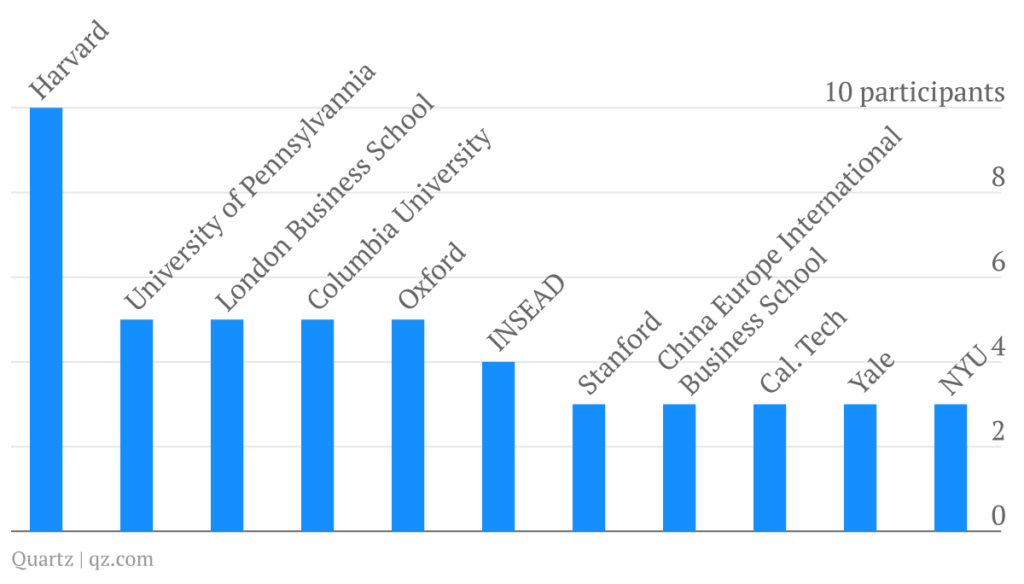
The top-down reorganization of the world economy by a cabal of technocratic corporativists, led by the group around the Davos World Economic Forum– the so-called Great Reset or UN Agenda 2030– is no future proposal. It is well into actualization as the world remains in insane lockdown for a virus. The hottest investment area since onset of the coronavirus global lockdowns is something called ESG investing.
United States
Politics and Policy
Jeffrey Zients (White House Coronavirus Response Coordinator since 2021, selected in 2003), Jeremy Howard (co-founder of lobby group “masks for all”, selected in 2013), California Governor Gavin Newsom (selected in 2005), Pete Buttigieg (selected in 2019, candidate for US President in 2020, US secretary of transportation since 2021), Chelsea Clinton (Clinton Foundation board member), Huma Abedin (Hillary Clinton aide, selected in 2012), Nikki Haley (US ambassador to the UN, 2017-2018), Samantha Power (US ambassador to the UN, 2013-2017, USAID Administrator since 2021), Ian Bremmer (founder of Eurasia Group), Bill Browder (initiator of the Magnitsky Act), Jonathan Soros (son of George Soros), Kenneth Roth (director of “Human Rights Watch” since 1993), Paul Krugman (economist, selected in 1995), Lawrence Summers (former World Bank Chief Economist, former US Treasury Secretary, former Harvard University President, selected in 1993), Alicia Garza (co-founder of Black Lives Matter, selected in 2020), Stéphane Bancel (Moderna CEO).
Media
CNN medical analyst Leana Wen (selected in 2018), CNN chief medical correspondent Sanjay Gupta, Covid Twitter personality Eric Feigl-Ding (a ‘WEF Global Shaper‘ since 2013), Andrew Ross Sorkin (New York Times financial columnist), Thomas Friedman (New York Times columnist, selected in 1995), George Stephanopoulos (ABC News, 1993), Lachlan Murdoch (CEO of Fox Corporation).
Technology and Social Media
Microsoft founder Bill Gates (1993), former Microsoft CEO Steven Ballmer (2000-2014, selected in 1995), Amazon founder Jeff Bezos (1998), Google co-founders Sergey Brin and Larry Page (2002/2005), former Google CEO Eric Schmidt (2001-2017, selected in 1997), Wikipedia co-founder Jimmy Wales (2007), PayPal co-founder Peter Thiel (2007), eBay co-founder Pierre Omidyar (1999), Facebook founder and CEO Mark Zuckerberg (2009), Facebook COO Sheryl Sandberg (2007).
Great Britain, Canada, Australia, New Zealand
Professor Devi Sridhar (a leading ‘zero covid’ proponent, selected in 2020/21), former British Prime Ministers Tony Blair and Gordon Brown (both selected in 1993), BBC World Service journalist Dawood Azami, Lynn Forester de Rothschild (co-owner of The Economist), Nathaniel Rothschild (son of Lord Rothschild), historian Niall Ferguson (selected in 2005), William Hague (Foreign Secretary, 2010-2014), Charles Allen (CEO of ITV, 2004-2007; Chairman of EMI, 2008-2010).
New Zealand Prime Minister Jacinda Ardern (since 2017, selected in 2014), Australian Health Minister Greg Hunt (selected in 2003; former WEF strategy director), Canadian Deputy Prime Minister Chrystia Freeland (selected in 2001; former managing director of Reuters). Canadian Prime Minister Justin Trudeau is a WEF participant, but is not a confirmed Young Global Leader.
Germany
Chancellor Angela Merkel (selected in 1993, 12 years before becoming Chancellor), current Health Minister Jens Spahn and former Health Ministers Philipp Roesler and Daniel Bahr, current co-chair of the Green Party and failed Chancellor candidate Annalena Baerbock (selected in 2020), former co-chair of the Green Party Cem Özdemir (selected in 2002), media mogul and Axel Springer CEO Mathias Doepfner (selected in 2001), talk show host Sandra Maischberger, late Foreign Minister and Vice Chancellor Guido Westerwelle (1997), former German President Christian Wulff (selected in 1995, 15 years before becoming President), Reto Francioni (former CEO of Deutsche Boerse).
European Union
EU Commission Presidents Jose Manuel Barroso (2004-2014, selected in 1993) and Jean-Claude Juncker (2014-2019, selected in 1995), French President Emanuel Macron (since 2017, selected in 2016), former French President Nicolas Sakozy (2007-2012, selected in 1993), Austrian Chancellor Sebastian Kurz, former Italian Prime Minister Matteo Renzi (2014-2016, selected in 2012), former Spanish Prime Minister Jose Maria Aznar (1996-2004, selected in 1993), Klaus Regling (CEO of the European Financial Stability Mechanism since 2012), Guy Verhofstadt (former Belgian Prime Minister, Chair of the Brexit Steering Group), Danish Minister for the Environment Lea Wermelin, Finnish Prime Minister Sanna Marin, former Finnish Prime Minister Alexander Stubb, and Mark Leonard (founding director of the Soros-funded European Council on Foreign Relations).
Switzerland
Natalie Rickli (Director of Health of the Canton of Zurich, selected in 2012), former Presidents of the Swiss National Council Christa Markwalder (selected in 2011) and Pascale Bruderer-Wyss (selected in 2009), Geneva politician Pierre Maudet (selected in 2013), NZZ media group CEO Felix R. Graf (selected in 2007), former Swiss Justice Minister Ruth Metzler (selected in 2002), former Swiss television CEO Roger de Weck (2011-2017, selected in 1994), former UBS CEOs Peter Wuffli (selected in 1994) and Marcel Rohner (selected in 2003), former Credit Suisse CEO Tidjane Tiam (1998).
2005 YGL Nomination Committee
The 2005 WEF Young Global Leaders Nomination Committee consisted primarily of major media publishers and editors, including Arthur Sulzberger and Steve Forbes (USA); James Murdoch, Jonathan Rothermere and Tom Glocer (UK); Arnaud Lagardère (France); Mathias Doepfner and Hubert Burda (Germany); Michael Ringer (Switzerland); and Carl-Johan Bonnier (Sweden).
This highly subjective and very controlled game is dramatically shifting global capital flows into a select group of “approved” corporate stocks and bonds. Notably it advances the dystopian UN Agenda 2030 or the WEF Great Reset agenda. The development is one of the most dangerous and least understood shifts in at least the past century.
The WEF has also been involved in the coronavirus pandemic in several ways.
First, the WEF was, together with the Gates Foundation, a sponsor of the prescient “Event 201” coronavirus pandemic simulation exercise, held in New York City on October 18, 2019 – the same day as the opening of the Wuhan Military World Games, seen by some as “ground zero” of the global pandemic. China itself has argued that US military athletes may have brought the virus to Wuhan.
Second, the WEF has been a leading proponent of digital biometric identity systems, arguing that they will make societies and industries more efficient, more productive and more secure. In July 2019, the WEF started a project to “shape the future of travel with biometric-enabled digital traveler identity management”. In addition, the WEF collaborates with the ID2020 alliance, which is funded by the Gates and Rockefeller foundations and runs a program to “provide digital ID with vaccines”. In particular, ID2020 sees the vaccination of children as “an entry point for digital identity.”
Third, WEF founder Klaus Schwab is the author of the book COVID-19: The Great Reset, published in July 2020, which argues that the coronavirus pandemic can and should be used for an “economic, societal, geopolitical, environmental and technological reset”, including, in particular, advancing global governance, accelerating digital transformation, and tackling climate change.
Finally, the WEF has been running, since 1993, a program called “Global Leaders for Tomorrow”, rebranded, in 2004, as “Young Global Leaders”. This program aims at identifying, selecting and promoting future global leaders in both business and politics. Indeed, quite a few “Young Global Leaders” have later managed to become Presidents, Prime Ministers, or CEOs (see below).
During the coronavirus pandemic, several WEF Global Leaders and Global Shapers (a junior program of the Global Leaders) have played prominent roles, typically promoting zero-covid strategies, lockdowns, mask mandates, and ‘vaccine passports’. This may have been a (largely failed) attempt to protect public health and the economy, or it may have been an attempt to advance the global transformation agenda outlined above, or perhaps both.
In this regard, some notable Young Leaders include Jeffrey Zients (US White House Coronavirus Response Coordinator), Stéphane Bancel (CEO of Moderna), Jeremy Howard (founder of influential lobby group “Masks for All”), Leana Wen (zero-covid CNN medical analyst), Eric Feigl-Ding (zero-covid Twitter personality), Gavin Newsom (Governor of California, selected in 2005), Devi Sridhar (British zero-covid professor), Jacinda Ardern (Prime Minister of New Zealand), Greg Hunt (Australian Health Minister and former WEF strategy director), French President Emanuel Macron (selected one year prior to his election in 2017), Austrian Chancellor Sebastian Kurz, German Chancellor Angela Merkel (selected back in 1993), German Health Minister Jens Spahn, and former British Prime Minister Tony Blair (a leading proponent of ‘global vaccine passports’).
On that note, here is as a list of some of the most influential and powerful attendees/members.
Klaus Schwab
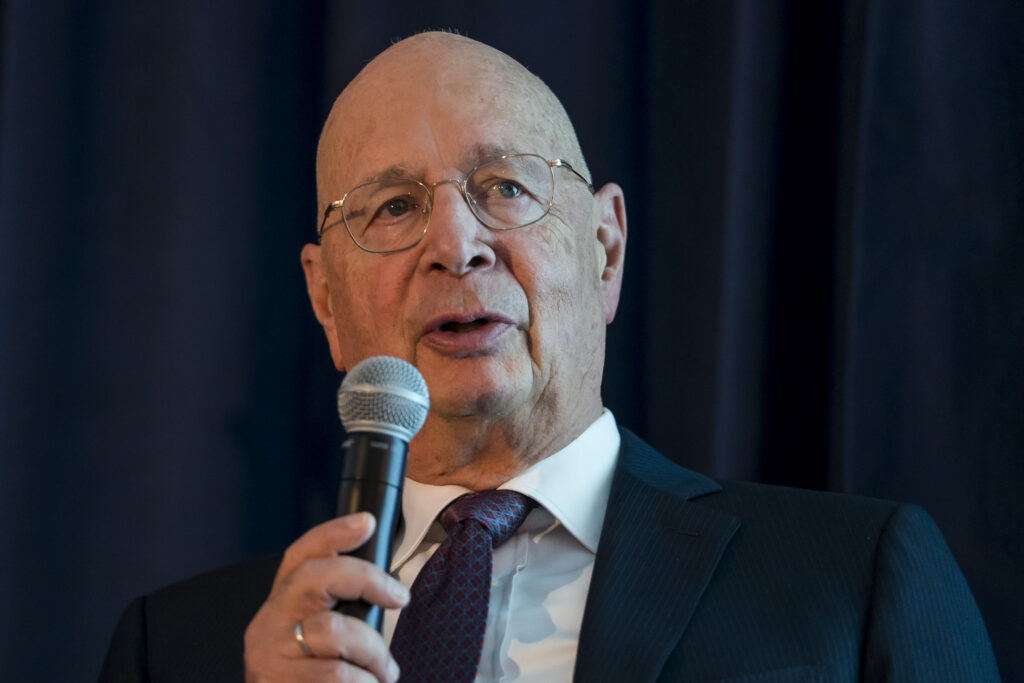
World Economic Forum / Ben Hider
Klaus Schwab’s Young Global Leaders class of 2021 include the Lieutenant Governor, State of Michigan, a Senior Vice-President at Uber, racist activist Ibram X Kendi and executives at Dow, Pfizer and Merck among many others.
Countries from all over the world are represented in the World Economic Forum’s latest crop of 112 potential globalist leaders. This class joins radical left luminaries such as Bill Gates, Jeff Bezos, Peter Buttigieg, Emmanuel Macron, Gavin Newsom, Angela Merkel, Jacinda Ardern and many others.
According to a book titled “Schwab Family Values” by Johnny Vedmore, Klaus Schwab is the son of a Nazi collaborator who used slave labor and aided Nazi efforts to obtain the first atomic bomb.
According to Vedmore, Schwab’s history has been almost completely scrubbed from the web. As always, we should be asking the question, what do they have to hide?
“Especially revealing is the history of Klaus’ father, Eugen Schwab, who led the Nazi-supported German branch of a Swiss engineering firm into the war as a prominent military contractor. That company, Escher-Wyss, would use slave labor to produce machinery critical to the Nazi war effort as well as the Nazi’s effort to produce heavy water for its nuclear program.
Years later, at the same company, a young Klaus Schwab served on the board of directors when the decision was made to furnish the racist apartheid regime of South Africa with the necessary equipment to further its quest to become a nuclear power.
With the World Economic Forum now a prominent advocate for nuclear non-proliferation and “clean” nuclear energy, Klaus Schwab’s past makes him a poor spokesperson for his professed agenda for the present and the future.
Yet, digging even deeper into his activities, it becomes clear that Schwab’s real role has long been to ‘shape global, regional and industry agendas’ of the present in order to ensure the continuity of larger, much older agendas that came into disrepute after World War II, not just nuclear technology, but also eugenics-influenced population control policies.
… through the World Economic Forum, Schwab has helped to rehabilitate eugenics-influenced population control policies during the post-World War II era, a time when the revelations of Nazi atrocities quickly brought the pseudo-science into great disrepute.
Is there any reason to believe that Klaus Schwab, as he exists today, has changed in any way? Or is he still the public face of a decades-long effort to ensure the survival of a very old agenda?”
The WEF (World Economic Forum) and the “Great Reset” could not afford to have Schwab’s historical ties to the Nazis exposed. Additionally, it is important to note that the WEF is a completely nepotistic organization, meaning that only a Schwab heir can run it.
Mark Carney
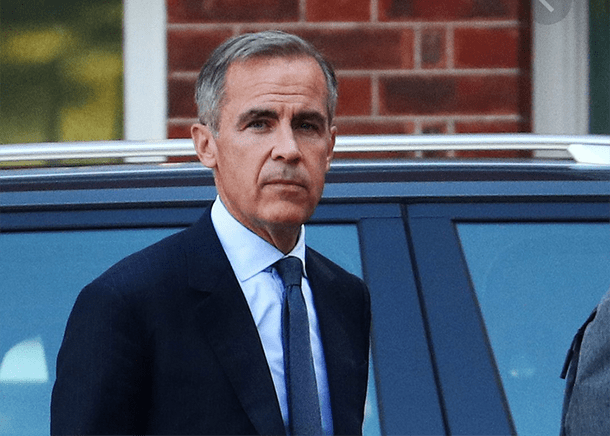
Mark Carney is at the center of reorganizing world finance to back the UN 2030 green agenda behind the WEF Davos Great Reset, where he is a member of the Board of Trustees. He also is Adviser to the UN Secretary General as United Nations Special Envoy for Climate Action. He has described the PCAF plan as follows:
“To achieve net zero we need a whole economy transition – every company, every bank, every insurer and investor will have to adjust their business models, develop credible plans for the transition and implement them. For financial firms, that means reviewing more than the emissions generated by their own business activity. They must measure and report the emissions generated by the companies they invest in and lend to. PCAF’s work to standardise the approach to measuring financed emissions is an important step to ensuring that every financial decision takes climate change into account.”
As Governor of the Bank of England Carney [pictured above] played a key role getting world central banks behind the Green Agenda of the UN 2030 scheme. The major central banks of the world, through their umbrella Bank for International Settlements (BIS) in Basle, created a key part of the growing global infrastructure that is steering investment flows to “sustainable” companies and away from those like oil and gas companies it deems “unsustainable.”
When then-Bank of England Governor Mark Carney was head of the BIS’ Financial Stability Board (FSB) he established something called Task-force on Climate-related Financial Disclosure (TCFD) in 2015.
Michael Bloomberg

AFP
The central bankers of the FSB nominated 31 people to form the TCFD. Chaired by billionaire Michael Bloomberg, it included in addition to BlackRock, JP MorganChase; Barclays Bank; HSBC; Swiss Re, the world’s second largest reinsurance; China’s ICBC bank; Tata Steel, ENI oil, Dow Chemical, mining giant BHP and David Blood of Al Gore’s Generation Investment LLC.
Anne Finucane
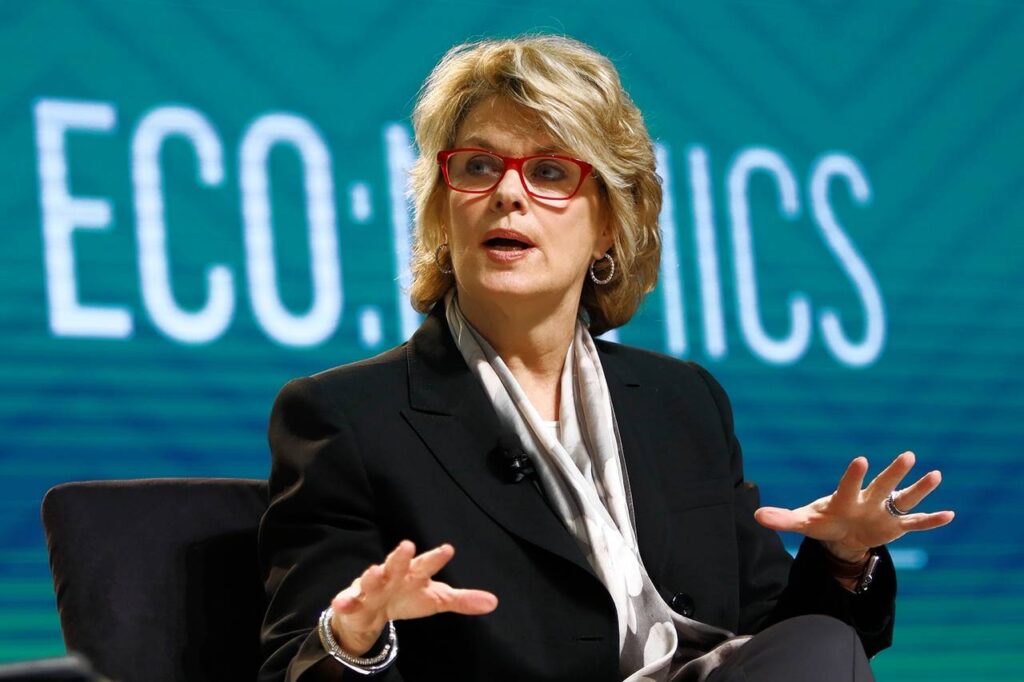
WSJ
Anne Finucane, the Vice Chair of the Bank of America, a member of both the PCAF and the TCFD, noted,
“we are committed to ensuring that climate-related risks and opportunities are properly managed within our business and that we are working with governments and markets to accelerate the changes required… climate change presents risks to the business community, and it is important for companies to articulate how these risks are being managed.”
The Bank of America vice chair describes how they assess risks in its real estate loan portfolio by assessing, “acute physical risk analysis on a sample portfolio of Bank of America residential mortgages across the US Each property was given a score based on the level of risk associated with 12 potential hazards: tornado, earthquake, tropical cyclone, hailstorm, wildfire, river flood, flash flood, coastal flood, lightning, tsunami, volcano, and winter storm.”
As well, the banks’ investment “risk” in oil and gas as well as other industrial sectors is reviewed using the criteria of Carney’s TCFD. All risks are defined as related to CO2, despite the fact there is no conclusive scientific proof that manmade CO2 emission is about to destroy our planet by global warming. Rather evidence of solar activity suggests we are entering an unstable cooling period, Grand Solar Minimum. That’s of no concern to the financial interests who stand to reap trillions in the coming decade.
Larry Fink
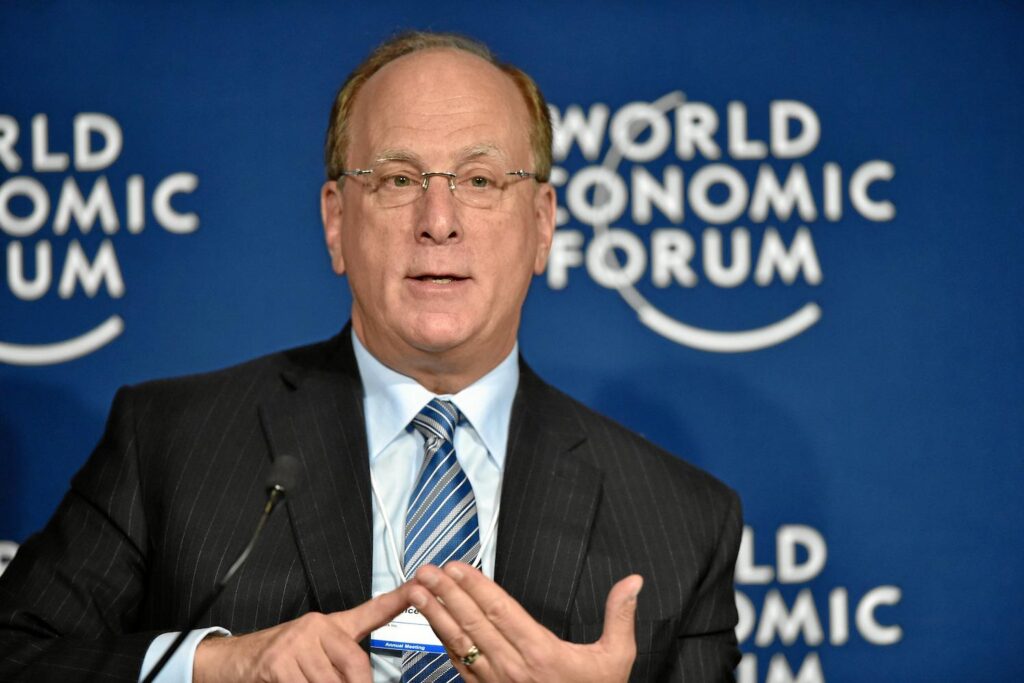
World Economic Forum
The immediate target of this financial cartel is the backbone of the world economy, the oil, coal and natural gas sector. Oil industry analysts predict that over the next five years or less investment flows into the world’s largest energy sector will fall dramatically. “Given how central the energy transition will be to every company’s growth prospects, we are asking companies to disclose a plan for how their business model will be compatible with a net zero economy,” BlackRock’s chairman and CEO Larry Fink wrote in his 2021 letter to CEOs. Blackrock is the world’s largest investment group with over $7 trillion to invest. Another BlackRock officer told a recent energy conference, “where BlackRock goes, others will follow.”
“To continue to attract capital, portfolios have to be built around core advantaged assets – low-cost, long-life, low carbon-intensive barrels,” said Andrew Latham, Vice President, Global Exploration at WoodMac, an energy consultancy.
The Biden Administration is already making good on his pledge to phase out oil and gas by banning new leases in Federal lands and offshore and the Keystone XL oil pipeline. The oil and gas sector and its derivatives such as petrochemicals are at the heart of the world economy. The 50 largest oil and gas companies in the world, including both state-owned and publicly traded companies, recorded revenues of about $5.4 trillion in 2015.
George Soros
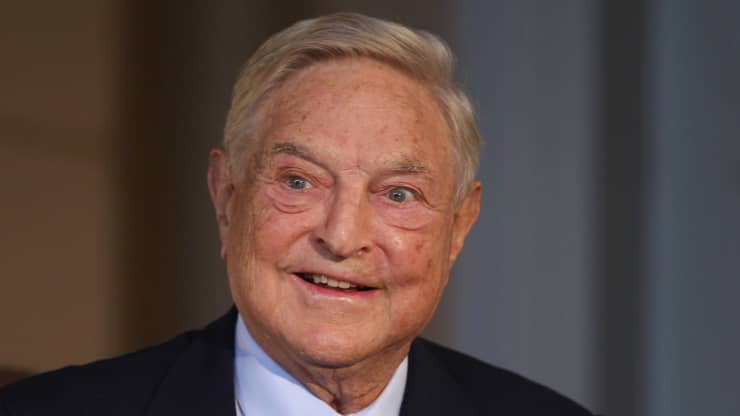
Sean Gallup | Getty Images
The billionaire investor George Soros is a familiar face in the Swiss Alps. In the last edition, Soros expressed his concerns over President Donald Trump’s foreign and economic policy.
“An effective policy towards China can’t be reduced to a slogan. It needs to be far more sophisticated, detailed and practical; and it must include an American economic response to the Belt and Road Initiative,” he said.
Alexander Soros
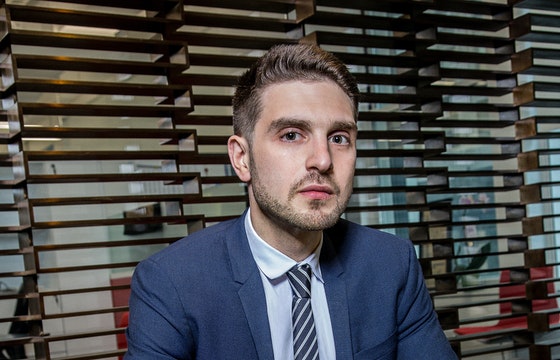
David de Rothschild
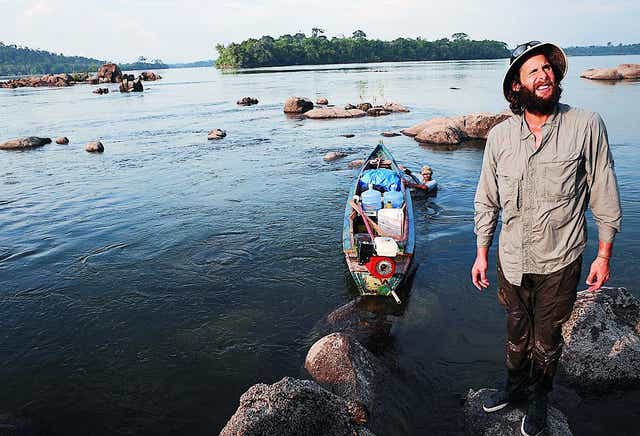
AFP/Getty Images
Donald Trump

Saul Loeb | AFP | Getty Images
U.S. President Donald Trump was set to attend the 2020 WEF. Trump cancelled his participation at the event in 2019, amid a row with the Democratic Party over security spending.
Ivanka Trump

AFP via Getty Images
Ivanka Trump faced a bitter backlash the morning after it was revealed that the cost of the rental cars used to ferry her around the World Economic Forum in Davos had hit nearly $34,000.
The 38-year-old first daughter came under heavy criticism on social media after the ‘eye-watering’ figure was published on a public database – with Quartz reporting that the cost of Ivanka’s vehicle rental for the two-day trip had pushed the total cost of the administration’s attendance to more than $4 million.
However, despite being slammed on social media over the whopping total, Ivanka put on a brave face as she took to the stage at the WEF in Switzerland to promote her father’s workforce initiatives.
Bill Gates
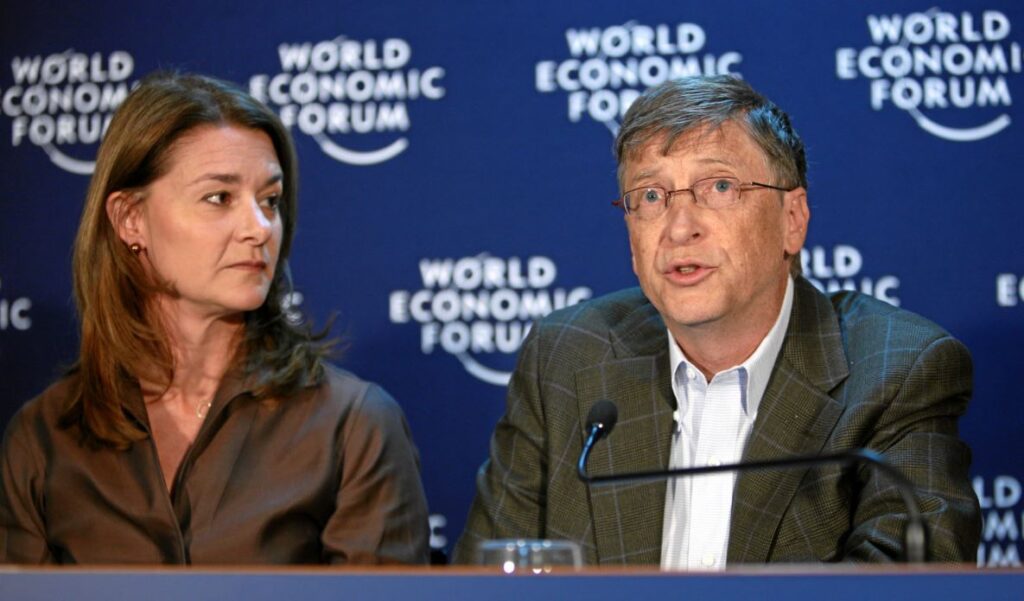
World Economic Forum/Remy Steinegger
Microsoft founder Bill Gates has called for an “aggressive” implementation of carbon taxes in order to accelerate the “great reset” by forcing rich western nations to alter their entire industry sectors.
Gates said, “rich countries have to play a central role, both funding RND and having policies, in some cases carbon taxes will be used to drive the demand for these clean products.”
“Only by doing that in an aggressive way will the economic costs be brought down enough that we can turn to all the middle-income countries and say ‘OK, change your whole cement industry, change your whole steel industry,’” Gates added.
“The number of companies working on these things is very exciting,” Gates proclaimed.
Mark Zuckerberg
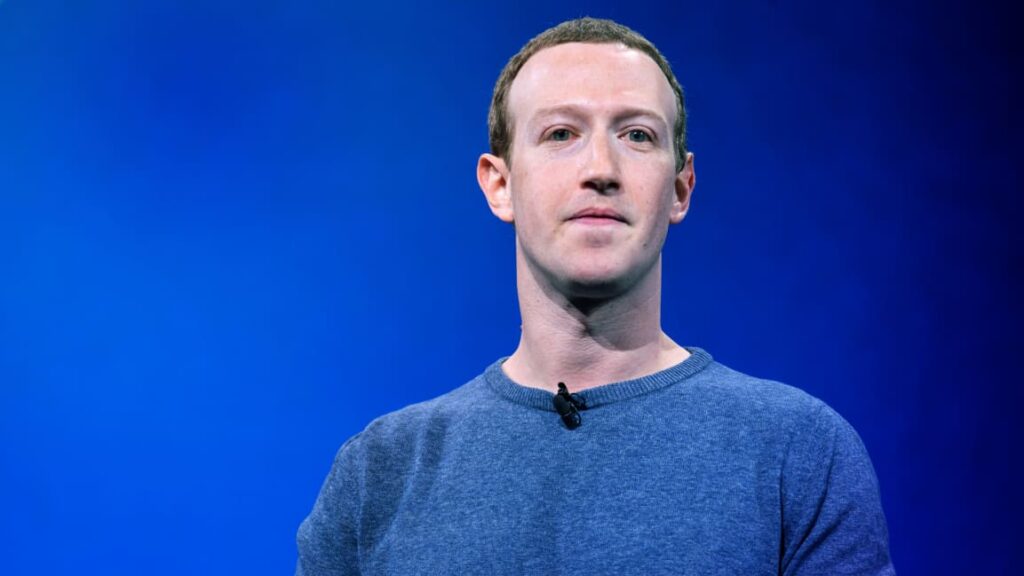
Steve Mnuchin

Denis Balibouse | Reuters
U.S. Treasury Secretary Steven Mnuchin led the discussion in Davos in 2017, having said at a news conference that a weaker dollar was good for the United States. His comments represented a shift in U.S. policy and sparked a dollar sell-off.
Christine Lagarde
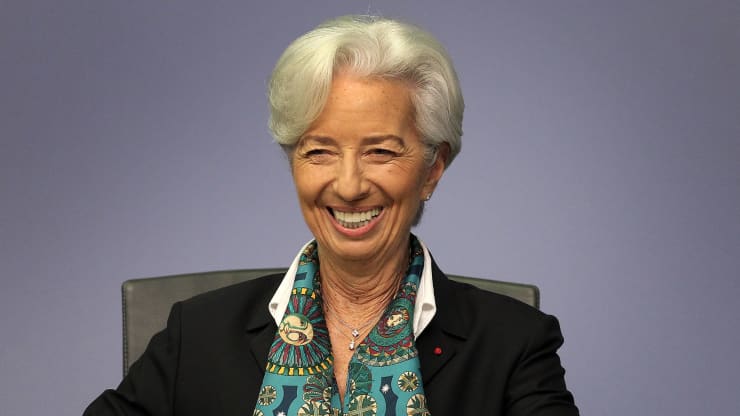
Daniel Roland | AFP | Getty Images
The newly-appointed head of the European Central Bank is a well-known figure at WEF. Lagarde, the first female president of the ECB, used to visit the event in her role as managing director of the International Monetary Fund.
This time around her words in Davos will be even more closely monitored, as investors look for further clues about the central bank’s strategic review. Lagarde made headlines in late 2019 when stating she wanted the ECB to make climate change a priority.
Ursula von der Leyen
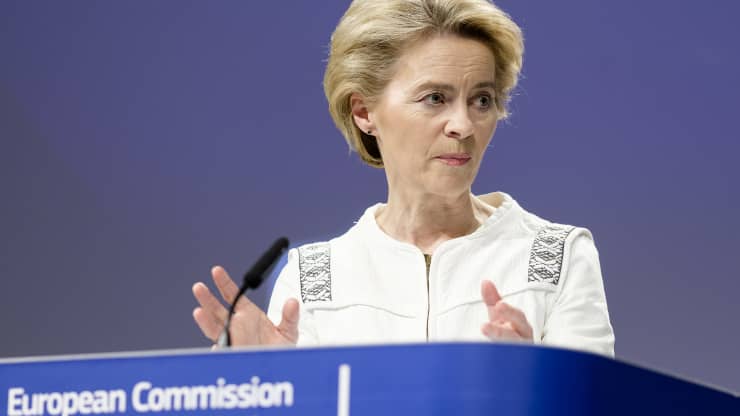
The former German minister for defense became the head of the EU’s executive arm in December. The new president of the European Commission has many pressing subjects to deal with, including gathering support for her new climate change package. The European Green Deal, a proposal launched in December, aims to make all the EU countries climate neutral by 2050.
Sanna Marin
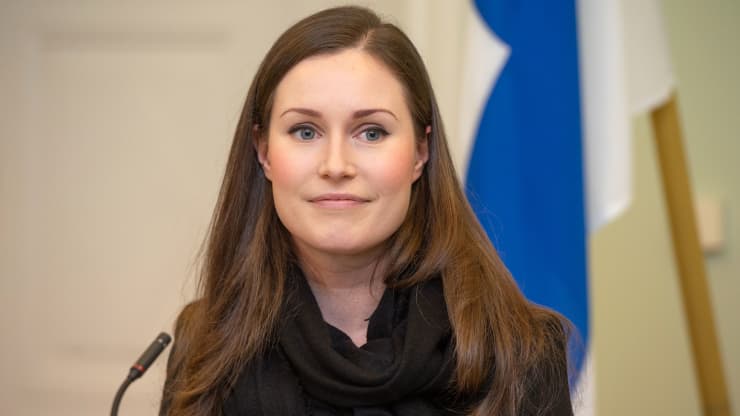
RAIGO PAJULA
At 34, Sanna Marin is the world’s youngest serving prime minister as well as Finland’s third female leader. She heads a four-party coalition government, whose leaders are all women too.
At the time of her appointment, in December, she said she never thought about her age or gender. “I think of the reasons I got into politics, and those things for which we have won the trust of the electorate,” she said.
Kristalina Georgieva
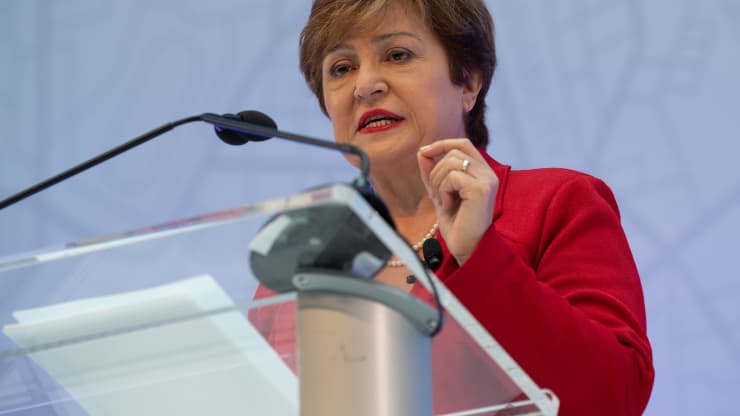
NICHOLAS KAMM | AFP | Getty Images
The Bulgarian national was appointed head of the International Monetary Fund in the fall of 2019. She will be presenting the IMF’s latest economic assessment in Davos, joined by Gita Gopinath, the institution’s chief economist.
- https://townhall.com/columnists/johnmacghlionn/2021/04/10/is-klaus-schwab-the-most-dangerous-man-in-the-world-n2587679
- https://qz.com/1787763/the-list-of-delegates-to-the-2020-world-economic-forum-in-davos/
- https://qz.com/45509/the-confidential-list-of-everyone-attending-davos-this-year/
- https://www.businessinsider.com/davos-by-the-numbers-billionaires-private-jets-security-bill-2020-1
- https://www.cnbc.com/2020/01/14/wef-2020-heres-who-is-going-to-davos-this-year.html
- https://anti-empire.com/how-is-the-davos-world-economic-forum-involved-in-the-coronavirus-pandemic/
- https://21stcenturywire.com/2021/03/23/the-great-reset-is-here-follow-the-money-lockdowns-are-part-of-the-green-agenda/
- https://wikispooks.com/wiki/WEF/Global_Leaders_for_Tomorrow
- https://wikispooks.com/wiki/WEF/Young_Global_Leaders
- https://www.younggloballeaders.org/community
- Pam Bondi and Kash Patel Are Protecting Elite Pedophiles - February 12, 2026
- Why the Dead Internet Theory Is True - February 11, 2026
- Why Republicans Will Lose the 2026 Midterms - February 8, 2026


